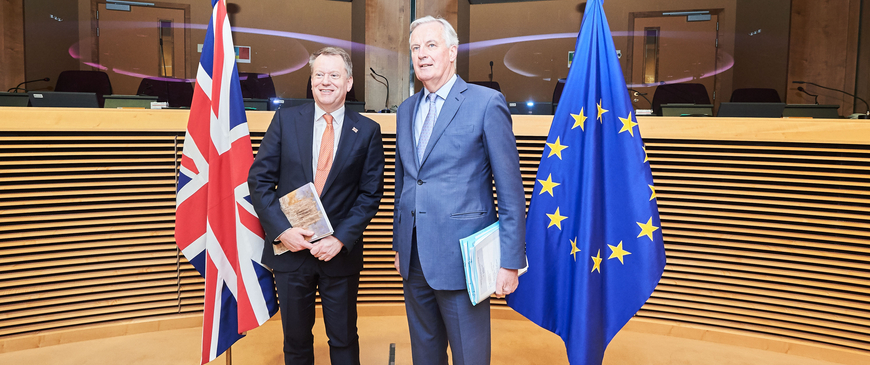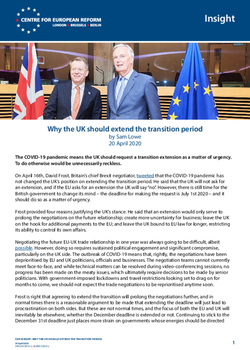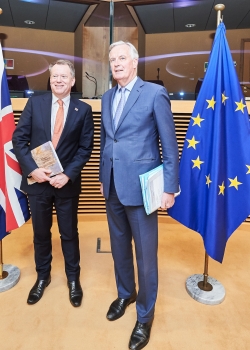
Why the UK should extend the transition period
The COVID-19 pandemic means the UK should request a transition extension as a matter of urgency. To do otherwise would be unnecessarily reckless.
On April 16th, David Frost, Britain’s chief Brexit negotiator, tweeted that the COVID-19 pandemic has not changed the UK’s position on extending the transition period. He said that the UK will not ask for an extension, and if the EU asks for an extension the UK will say “no”. However, there is still time for the British government to change its mind – the deadline for making the request is July 1st 2020 – and it should do so as a matter of urgency.
There is still time for the British government to change its mind – the deadline for making the request is July 1st 2020 – and it should do so as a matter of urgency.
Frost provided four reasons justifying the UK’s stance. He said that an extension would only serve to prolong the negotiations on the future relationship; create more uncertainty for business; leave the UK on the hook for additional payments to the EU; and leave the UK bound to EU law for longer, restricting its ability to control its own affairs.
Negotiating the future EU-UK trade relationship in one year was always going to be difficult, albeit possible. However, doing so requires sustained political engagement and significant compromise, particularly on the UK side. The outbreak of COVID-19 means that, rightly, the negotiations have been deprioritised by EU and UK politicians, officials and businesses. The negotiation teams cannot currently meet face-to-face, and while technical matters can be resolved during video-conferencing sessions, no progress has been made on the meaty issues, which ultimately require decisions to be made by senior politicians. With government-imposed lockdowns and travel restrictions looking set to drag on for months to come, we should not expect the trade negotiations to be reprioritised anytime soon.
Frost is right that agreeing to extend the transition will prolong the negotiations further, and in normal times there is a reasonable argument to be made that extending the deadline will just lead to procrastination on both sides. But these are not normal times, and the focus of both the EU and UK will inevitably be elsewhere, whether the December deadline is extended or not. Continuing to stick to the December 31st deadline just places more strain on governments whose energies should be directed elsewhere, and increases the chance of the negotiations failing or reaching a suboptimal outcome solely because of dogmatic adherence to an ultimately arbitrary date.
Furthermore, the British government seeks a zero-tariff agreement, but one that will result in a large increase in regulatory and administrative hurdles for trading companies. Extending the transition would give business more certainty, not less: the status quo would continue for a good while into the future and they would not be asked to shift their focus to Brexit during the worst of the pandemic. The alternative is to tell business owners that even in the best case scenario, with many companies already on their knees as a result of the COVID-19-induced economic downturn, their lives are going to become more difficult on New Year’s Day 2021.
Even under an optimistic scenario of the pandemic being contained over the coming months, followed by an easing of the lockdown, we should not expect a swift return to normality. There will probably be a hangover as consumer behaviour, private sector investment and employment takes time to return to normal. In this context, the additional shock of drastically increasing trade friction with the UK’s biggest trading partner would be unwelcome. And while the cost of Brexit will be significantly smaller than the initial COVID-19 hit, most of the COVID-19 fallout will hopefully be temporary, whereas Brexit will result in a permanent loss to the UK’s economy.
Britain’s government and its voters have seemingly decided that such an economic hit is preferable to continued membership of the EU. That is their prerogative, but that is no reason to impose it at the exact moment the British economy is already reeling from the biggest shock in a century. And while some in government believe that exiting the transition period without an agreement in place is tolerable, and that the COVID-19 fallout could mask any negative economic consequences, such a decision would be deeply irresponsible. Thankfully, Boris Johnson already demonstrated that he is more risk-averse than some of his colleagues when he chose to extend the Article 50 period in October last year, despite previously pledging not to.
Frost is also right that extending the transition period would result in the UK having to pay more money to the EU. Yet, in the context of the billions of pounds being spent on keeping the economy on ice by governments across the world, a few more spent on ensuring that trade in food, goods and medical supplies continues to flow freely between the UK and its most significant trading partner for a little while longer seems like money well spent.
As to Frost’s line that the UK needs to be free of EU rules so as to ensure maximum flexibility to act in increasingly tumultuous times, the argument would hold more weight if the suggestion was to remain bound to EU rules, without a say, indefinitely. Rather, the proposal is to extend the transition for a limited period of time, to allow both the UK and EU to focus on more urgent matters. The transition period evidently has not inhibited the UK’s ability to act in the early stages of the crisis, and it is difficult to see why it would do so in the immediate future.
Another argument put forward by Shanker Singham of the Institute of Economic Affairs is that the transition period should not be extended because it would slow down trade talks with other countries and the US in particular. This is not a convincing argument; COVID-19 means that trade negotiations with the UK are not a priority for any country right now, and with a November election forthcoming in the US, there is next to no chance of a comprehensive trade deal between the US and UK coming into force next year. Regardless, avoiding additional trade friction with its most important trade partner in the middle of a pandemic should be prioritised by the UK over the potential to marginally hasten the removal of barriers with less important trading partners. In the meantime, for COVID-19 purposes, the EU, and therefore the UK, has already moved to unilaterally remove import tariffs on essential medical supplies.
If the UK insists on finalising a trade agreement this year, there is another way to partially maintaining the status quo well into 2021: a new implementation or standstill period. I have previously argued that a new implementation period would be necessary to avoid a day one cliff-edge for business irrespective of COVID-19. But in the context of businesses now being even less prepared than they would have been otherwise, an implementation period would be essential. However, a new implementation period requires there to be a deal – which requires agreement between the EU and UK on issues such as fishing quotas, state aid rules and the implementation of the Northern Ireland protocol. This brings us full circle: the COVID-19 pandemic means the chances of a deal being agreed in time are smaller now than they were before, and thus the probability of a supplementary implementation period being agreed is smaller too. The only guaranteed solution is an extension on the transition period.
In any case, a new implementation period would not fully replicate the status quo. It would probably be limited to areas that are of exclusive EU competence to avoid the need for ratification by national parliaments. So, for example, it is possible that Britain could stay in the single market for goods and the customs union for a period of time. But other areas of shared competence, such as transport services, would require unilateral bridging measures similar to those proposed for no deal to be taken by the EU, UK and member-states to plug the gaps. Given the extraordinary circumstances, and the need to avoid a tumultuous end to an already difficult year, the UK should not leave itself reliant on an uncertain future implementation period when it already has a readily available option in the form of transition extension.
Brexit has happened and the UK has left the EU. The debate about extending the transition is not about trying to frustrate Brexit, but about whether more time is needed for the UK to negotiate its future trading relationship with the EU, in the context of a global pandemic sucking up nearly all available government and business time, money and focus. A pragmatic approach would see the EU and UK agree to the maximum two-year extension, while stating that an earlier exit is possible if requested by one of the parties (perhaps with three months’ notice). If the full two years is too politically difficult for the UK, then one year could suffice.
While agreeing to an extension of the transition period would require Boris Johnson to row back on past promises, he would have a valid excuse.
While agreeing to an extension of the transition period would require Boris Johnson to row back on past promises, he would have a valid excuse. It is difficult to believe that any but the most extreme of Brexit supporters would not accept the argument that a global pandemic has led to the attentions of the EU and UK being elsewhere for the moment, meaning they are going to need a little more time to negotiate a trade deal. Regardless, leadership is not about pandering to the most dogmatic elements of your party and population: it is about taking decisions that are in the best interest of the country, whether they prove unpopular or not.
Sam Lowe is a senior research fellow at the Centre for European Reform.




Add new comment